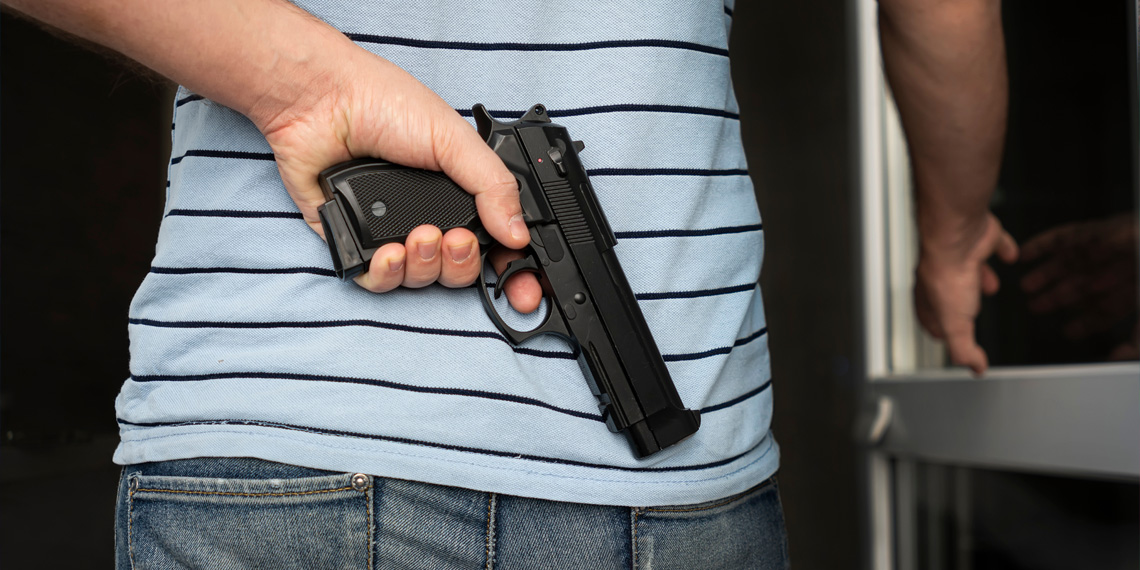A new study published in Psychology of Violence has uncovered a key link between psychopathic traits and firearm violence. The research found that individuals with certain psychopathic tendencies, especially those related to emotional coldness and antisocial behavior, are more likely to engage in illegal gun use and violent confrontations. Interestingly, the study also revealed that psychopathy has no connection to legal gun carrying, highlighting a distinction between lawful and unlawful firearm behaviors.
Psychopathy is one factor that has been linked to violence in general. It is a personality disorder characterized by traits such as emotional coldness, manipulativeness, impulsivity, and a lack of regard for the well-being of others. Although individuals with psychopathic traits make up only a small percentage of the population, they are responsible for a disproportionately large share of violent crimes. The disorder is divided into different facets, including affective traits (lack of empathy), interpersonal traits (manipulativeness), impulsive lifestyle behaviors, and antisocial tendencies.
The rationale for the study was to explore the connection between psychopathy and gun violence, particularly in the context of the U.S., where firearms are often involved in violent crimes. While previous research has linked psychopathy to general violence, the new study aimed to fill a gap in the literature by focusing specifically on gun-related behaviors.
“The goal of my research is to improve our understanding of what drives violence, particularly gun violence. This knowledge can help us develop more targeted prevention and intervention strategies,” said study author Nicholas D. Thomson, an associate professor at Virginia Commonwealth University, the director of research for the Injury and Violence Prevention Program at VCU Health Trauma Center, and author of Understanding Psychopathy: The Biopsychosocial Perspective.
His co-author, postdoctoral fellow Sophie L. Kjaervik, explained that “the link between psychopathic traits and various forms of gun behaviors is of interest to me because my work focuses on individual differences in aggression and violence.”
The study was conducted using a sample of 343 adult participants who had been treated for violent injuries at a trauma center in Virginia. These individuals, ranging in age from 18 to 75, were recruited because they were considered to be at high risk for future violence. The majority of participants were male (74%) and identified as Black or African American (65%). All participants completed a series of interviews and self-report surveys to assess their psychopathic traits and gun-related behaviors.
The study’s findings revealed significant associations between certain facets of psychopathy and gun-related behaviors. Most notably, the antisocial facet was strongly linked to carrying a gun without a legal permit. This suggests that individuals with antisocial tendencies, characterized by impulsivity and a disregard for social norms, are more likely to engage in illegal gun behaviors.
Those who reported using a firearm in self-defense also scored higher on measures of antisocial behavior. This may reflect a tendency for individuals with antisocial traits to find themselves in situations where violence escalates, requiring them to use a gun for protection. Alternatively, these individuals may perceive or frame their actions as self-defense in situations where they are actually the aggressors.
The researchers also found that both the antisocial and affective facets were linked to firearm violence, meaning individuals high in these traits were more likely to have engaged in violent gun-related incidents.
The study demonstrated “a clear association between psychopathic tendencies and specific gun-related behaviors in adults, including carrying a concealed gun without a permit, shooting a gun in self-defense, and engaging in firearm violence,” Kjaervik told PsyPost.
“While this is one of the few studies exploring the relationship between gun violence and psychopathy, there is substantial data showing psychopathy is robustly linked violence more generally,” Thomson noted. “These findings are in line with our expectations.”
Interestingly, the study found no connection between psychopathy and carrying a concealed gun with a legal permit. This suggests that individuals who follow legal procedures for carrying firearms may not be driven by the same psychological factors as those who carry guns illegally.
The absence of a link between legal gun carrying and psychopathy highlights the potential differences in motivations between lawful gun owners and those who engage in illegal or violent gun behaviors. This distinction could be important for informing gun violence prevention efforts.
“This means that psychopathy differentiates those who engage in gun violence from others but does not predict legal gun use, suggesting that psychopathy is an important target for gun violence prevention efforts that do not impact law-abiding owners,” Kjaervik explained.
The findings shed light on the relationship between psychopathic traits and gun violence. However, the cross-sectional design of the research limits the ability to draw conclusions about cause and effect. The study only shows correlations between psychopathic traits and gun-related behaviors, but it does not establish whether these traits cause individuals to engage in violence or illegal gun use. Longitudinal research, which tracks individuals over time, would be needed to clarify the direction of these relationships.
The study highlights several areas for future investigation. First, researchers should continue to explore the relationship between psychopathy and gun violence, especially with a focus on different types of violence, such as proactive (planned) versus reactive (impulsive) aggression. These distinctions could help clarify which aspects of psychopathy are most relevant to different forms of violence. Additionally, future studies should examine the role of sex differences, as this study’s predominantly male sample may not capture important variations in gun-related behaviors among women.
“Our goal is to develop a solid understanding of what drives gun violence,” Thomson said. “With this knowledge we can develop more targeted intervention and prevention programs to stop gun violence.”
The study, “Psychopathy, Gun Carrying, and Firearm Violence,” was published online on August 22, 2024.




